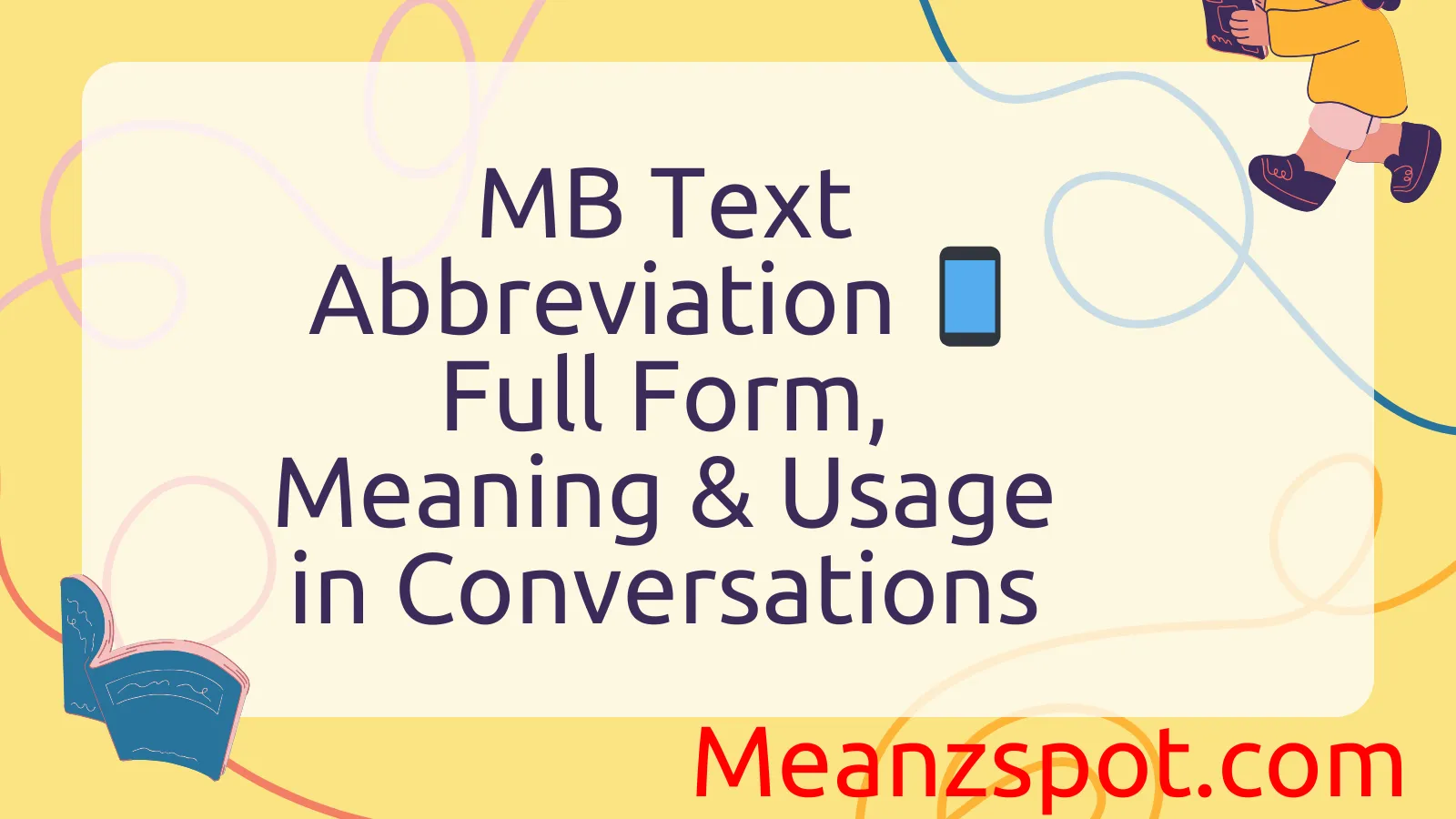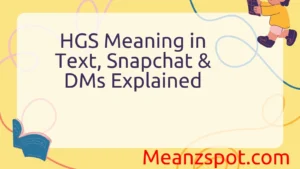Ever spotted MB in a text message and felt confused? You’re not alone. With so many chat abbreviations and internet slang terms, it’s easy to get lost in the shorthand. MB is a common one that pops up across texts, Snapchat, Instagram, and even casual emails.
The good news is—it has a simple meaning that’s easy to remember. In this guide, we’ll explain the full form of MB, what it really means in different contexts, and show you examples of how people use it in everyday conversations. By the end, you’ll be able to reply confidently without missing a beat.
Definitions & Meaning
The abbreviation “MB” in text usually stands for “my bad.” It’s a casual way to admit a small mistake or take blame for something. Think of it as a laid-back apology—less formal than saying “I’m sorry” but still showing you recognize your error.
Example:
- Friend 1: “You forgot to bring the charger.”
- Friend 2: “Oh, MB! I’ll grab it next time.”
Other potential meanings of “MB” in texting or chat include:
- Maybe: Sometimes used when someone is unsure.
- Message Back: Used to prompt a reply.
- Megabyte: More technical, common in contexts related to file size or downloads.
However, in casual text or conversation, “my bad” is by far the most frequent interpretation. It’s friendly, nonchalant, and often used when the mistake is minor and doesn’t require a formal apology.
So, next time you see “MB” after pointing out a mistake or slip-up, just know it’s someone’s way of saying, “Oops, that one’s on me.”
Origins & History
The phrase “my bad” didn’t begin in text messages—it’s been around for decades. It’s believed to have originated in American street basketball culture during the 1970s or 1980s. Players used “my bad” as a quick way to acknowledge a mistake on the court without stopping the game.
It gained mainstream popularity in the 1990s, especially after appearing in TV shows and movies. One standout moment came in the 1995 film Clueless, where the main character casually says, “My bad,” introducing the phrase to an even wider audience.
As texting and online messaging became more common, long phrases like “my bad” started getting shortened. That’s where MB comes in. Abbreviating it makes it faster and easier to type, especially on phones or while gaming.
While “my bad” may have had athletic or pop culture roots, MB is the modern-day shorthand that lives on in our screens, chats, and tweets.
Usage in Different Contexts
1. Social Media
On platforms like Instagram, TikTok, or Twitter (now X), MB is frequently used in captions, comments, or direct messages when someone wants to casually own up to a mistake.
Example:
“Posted the wrong link in my story—MB y’all 😅”
2. Text Messages & Chat Apps
Whether you’re texting your best friend or chatting in a group on WhatsApp or Discord, MB is a go-to response for low-stakes mess-ups.
Example:
“You meant 5 PM, not 6? MB! I’ll be there.”
3. Gaming
In multiplayer games, where every second counts, quick abbreviations are essential. Players use MB to acknowledge a slip-up without slowing down gameplay.
Example:
“MB for friendly fire 😬 won’t happen again.”
4. Professional Settings
Though less common in formal emails, MB might show up in casual work chats like Slack or Microsoft Teams when a colleague admits to a small error.
Example:
“Forgot to attach the doc—MB, uploading now.”
5. Pop Culture & Memes
MB also makes its way into memes or tweet threads where people poke fun at themselves or admit to relatable fails.
Example Meme Caption:
“Texted ‘I love you’ to my boss instead of my boyfriend… MB 😭”
Common Misunderstandings & Clarifications
Given that MB has several possible meanings, it can sometimes cause confusion. Let’s clear up some of the most common misunderstandings.
1. MB Means Megabyte?
Yes, MB can mean megabyte, but this is usually only in contexts involving file sizes, downloads, or storage.
Text Example (tech context):
“This video is 150 MB—won’t load on my phone.”
But if someone says MB in a casual chat after making a mistake, they almost certainly mean “my bad.”
2. MB = Maybe?
Sometimes people use MB as short for maybe, especially when making quick decisions or plans.
Example:
“MB we can go out later if it stops raining.”
But this usage is less common and usually inferred through context.
3. MB vs. Sorry
While “MB” is a kind of apology, it’s not suitable for serious situations. It’s best used for minor goof-ups or casual settings. If you’ve truly hurt someone’s feelings, a sincere “I’m sorry” is always better.
4. MB Is Not a Formal Term
Don’t use “MB” in formal writing, academic work, or professional emails. It’s meant for informal and conversational communication only.
Alternatives & Synonyms
If you’re not feeling the vibe of “MB,” there are several other short, casual ways to express the same idea.
Here are some alternatives:
- Oops – Light and playful
“Oops, forgot your coffee.” - My fault – Slightly more serious than “MB”
“That was my fault, sorry!” - Sorry – Simple and classic
“Sorry, didn’t see your message.” - Didn’t mean to – Clarifies that it wasn’t intentional
“Didn’t mean to miss your call.” - I messed up – Accepts responsibility
“I messed up the order—totally my bad.”
Depending on the situation, you can switch between these based on tone, audience, and how serious the mistake was. But in quick texts or funny group chats, MB does the job just fine.
Frequently Asked Questions (FAQ)
1. What does MB stand for in texting?
It usually stands for “my bad,” a casual way of saying you made a mistake or taking the blame.
2. Is MB the same as saying sorry?
Not exactly. MB is more informal and used for small mistakes. “Sorry” is more appropriate for serious or emotional situations.
3. Can MB mean something else besides “my bad”?
Yes, depending on context, MB can also mean “megabyte,” “maybe,” or “message back.”
4. Is it okay to use MB in professional chats?
It depends on the workplace culture. In casual team chats like Slack, it might be fine. But avoid it in formal emails or with clients.
5. Where did MB come from?
The abbreviation comes from the phrase “my bad,” which has roots in American street basketball and became popular in pop culture during the 1990s.
6. Can I use MB in a text apology?
Yes, if the situation is lighthearted and informal. But for serious matters, use a more heartfelt apology.
7. Why do people use MB instead of typing out “my bad”?
Typing “MB” is faster, saves space, and fits the casual tone of most digital conversations.
Conclusion
In the fast-paced world of texting and social media, “MB” serves as a quick and easy way to say “my bad.” Whether you forgot to reply, made a typo, or messed up plans, MB lets others know you recognize your mistake—without overdoing it.
It’s informal, widely recognized, and perfect for lighthearted conversations. Still, like any abbreviation, context matters. While MB works great in casual chats or meme culture, it’s best to steer clear of it in formal or serious discussions.



